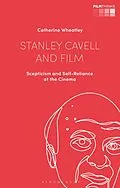"Film is made for philosophy," asserted Stanley Cavell. In addition to his work on scepticism, morality, and the intentions and meanings of ordinary language, the American philosopher wrote fascinatingly about cinema, arguing that film can reveal new ground for thinking through old philosophical problems. In this book, Catherine Wheatley draws upon Cavell's explicitly film-inspired works, key philosophical concepts and autobiographical writings, examining his analyses of films from Hollywood's Golden Age, the French New Wave, contemporary action cinema, silent film heroes Chaplin and Keaton, directors Cocteau and Hitchcock, and performers Greta Garbo and Ginger Rogers. Revealing the ways in which Cavell's thinking was shaped by the movies, Wheatly poses the question: what was it about film that taught the philosopher how best to live in the world?
Autorentext
Catherine Wheatley is Lecturer in Film Studies at King's College London, UK. She is the author of Michael Haneke's Cinema: The Ethic of the Image (2008) and the co-editor of Je t'aime... moi non plus (2010).
Inhalt
List of Figures
Acknowledgements
Introduction
1. A Life in Movies
2. Everything Matters
3. Screening Scepticism
4. Acknowledgement, Other Minds
5. Self-Reliance
6. Perfectionism, Friendship, Education
7. Love's Work
Postscript: The End. The Beginning
Bibliography
